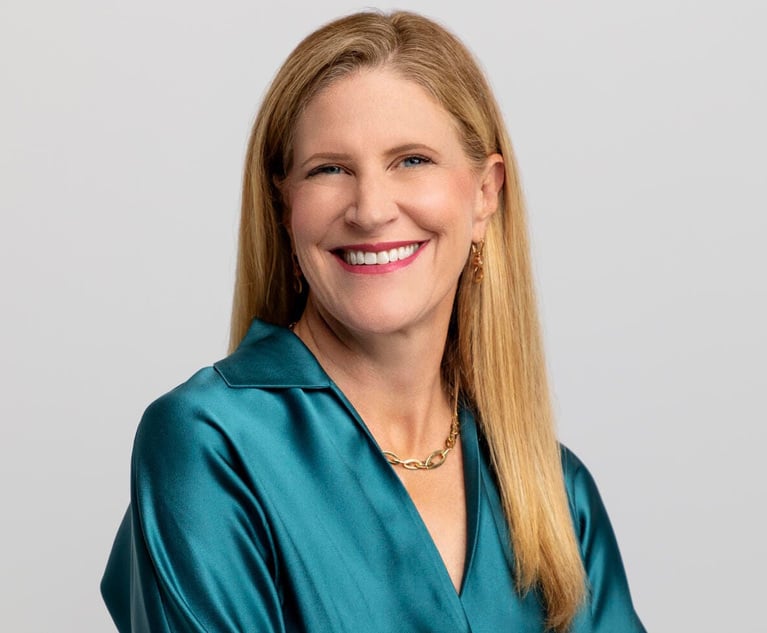Panelists discuss whether pay-for-delay settlements violate antitrust laws
The Supreme Court is considering whether pay-for-delay deals violate antitrust laws, and so, on Wednesday, did a group of lawyers at an intellectual property conference in Virginia.
April 05, 2013 at 07:40 AM
2 minute read
The original version of this story was published on Law.com
The Supreme Court is considering whether pay-for-delay deals violate antitrust laws, and so, on Wednesday, did a group of lawyers at an intellectual property conference in Virginia.
Pay-for-delay settlements, in which a brand-name drug manufacturer pays a generic manufacturer to postpone the release of generic drugs into the market, have been on the rise recently. In March, the Supreme Court heard arguments in Federal Trade Commission (FTC) v. Actavis Inc. In that case, the FTC alleges that these kinds of settlements are inherently anticompetitive.
At the American Bar Association's IP conference, lawyers from Covington & Burling; McDonnell, Boehnen, Hulbert & Berghoff; and Paul Hastings discussed the advantages and disadvantages of the deals. While many regulators see them as a way to advance monopolies, drug companies say they use them to avoid costly litigation. Panelists at the ABA conference said courts should consider if these settlements would still exist without litigation in the picture. One panelist said he thought business deals that benefit both parties should still be allowed.
The Supreme Court's decision in FTC v. Actavis is expected in June.
Read more at Thomson Reuters.
For more InsideCounsel coverage of pay-for-delay settlements, see below:
This content has been archived. It is available through our partners, LexisNexis® and Bloomberg Law.
To view this content, please continue to their sites.
Not a Lexis Subscriber?
Subscribe Now
Not a Bloomberg Law Subscriber?
Subscribe Now
NOT FOR REPRINT
© 2025 ALM Global, LLC, All Rights Reserved. Request academic re-use from www.copyright.com. All other uses, submit a request to [email protected]. For more information visit Asset & Logo Licensing.
You Might Like
View All
Former Capital One Deputy GC Takes Legal Reins of AIG Spinoff

Legal Departments Dinged for Acquiescing to Rate Hikes That 'Defy Gravity'
4 minute read
Apple Disputes 'Efforts to Manufacture' Imaging Sensor Claims Against iPhone 15 Technology
Trending Stories
- 1Sullivan & Cromwell Signals 5-Day RTO Expectation as Law Firms Remain Split on Optimal Attendance
- 2CLOSED: These Georgia Courts Won't Open Jan. 10
- 3Volkswagen Hit With Consumer Class Action Alleging Defective SUV Engines
- 4‘Be Comfortable With the Uncomfortable’
- 5Here's What Corporate Litigators Expect Delaware Courts to Address in 2025
Who Got The Work
Michael G. Bongiorno, Andrew Scott Dulberg and Elizabeth E. Driscoll from Wilmer Cutler Pickering Hale and Dorr have stepped in to represent Symbotic Inc., an A.I.-enabled technology platform that focuses on increasing supply chain efficiency, and other defendants in a pending shareholder derivative lawsuit. The case, filed Oct. 2 in Massachusetts District Court by the Brown Law Firm on behalf of Stephen Austen, accuses certain officers and directors of misleading investors in regard to Symbotic's potential for margin growth by failing to disclose that the company was not equipped to timely deploy its systems or manage expenses through project delays. The case, assigned to U.S. District Judge Nathaniel M. Gorton, is 1:24-cv-12522, Austen v. Cohen et al.
Who Got The Work
Edmund Polubinski and Marie Killmond of Davis Polk & Wardwell have entered appearances for data platform software development company MongoDB and other defendants in a pending shareholder derivative lawsuit. The action, filed Oct. 7 in New York Southern District Court by the Brown Law Firm, accuses the company's directors and/or officers of falsely expressing confidence in the company’s restructuring of its sales incentive plan and downplaying the severity of decreases in its upfront commitments. The case is 1:24-cv-07594, Roy v. Ittycheria et al.
Who Got The Work
Amy O. Bruchs and Kurt F. Ellison of Michael Best & Friedrich have entered appearances for Epic Systems Corp. in a pending employment discrimination lawsuit. The suit was filed Sept. 7 in Wisconsin Western District Court by Levine Eisberner LLC and Siri & Glimstad on behalf of a project manager who claims that he was wrongfully terminated after applying for a religious exemption to the defendant's COVID-19 vaccine mandate. The case, assigned to U.S. Magistrate Judge Anita Marie Boor, is 3:24-cv-00630, Secker, Nathan v. Epic Systems Corporation.
Who Got The Work
David X. Sullivan, Thomas J. Finn and Gregory A. Hall from McCarter & English have entered appearances for Sunrun Installation Services in a pending civil rights lawsuit. The complaint was filed Sept. 4 in Connecticut District Court by attorney Robert M. Berke on behalf of former employee George Edward Steins, who was arrested and charged with employing an unregistered home improvement salesperson. The complaint alleges that had Sunrun informed the Connecticut Department of Consumer Protection that the plaintiff's employment had ended in 2017 and that he no longer held Sunrun's home improvement contractor license, he would not have been hit with charges, which were dismissed in May 2024. The case, assigned to U.S. District Judge Jeffrey A. Meyer, is 3:24-cv-01423, Steins v. Sunrun, Inc. et al.
Who Got The Work
Greenberg Traurig shareholder Joshua L. Raskin has entered an appearance for boohoo.com UK Ltd. in a pending patent infringement lawsuit. The suit, filed Sept. 3 in Texas Eastern District Court by Rozier Hardt McDonough on behalf of Alto Dynamics, asserts five patents related to an online shopping platform. The case, assigned to U.S. District Judge Rodney Gilstrap, is 2:24-cv-00719, Alto Dynamics, LLC v. boohoo.com UK Limited.
Featured Firms
Law Offices of Gary Martin Hays & Associates, P.C.
(470) 294-1674
Law Offices of Mark E. Salomone
(857) 444-6468
Smith & Hassler
(713) 739-1250







